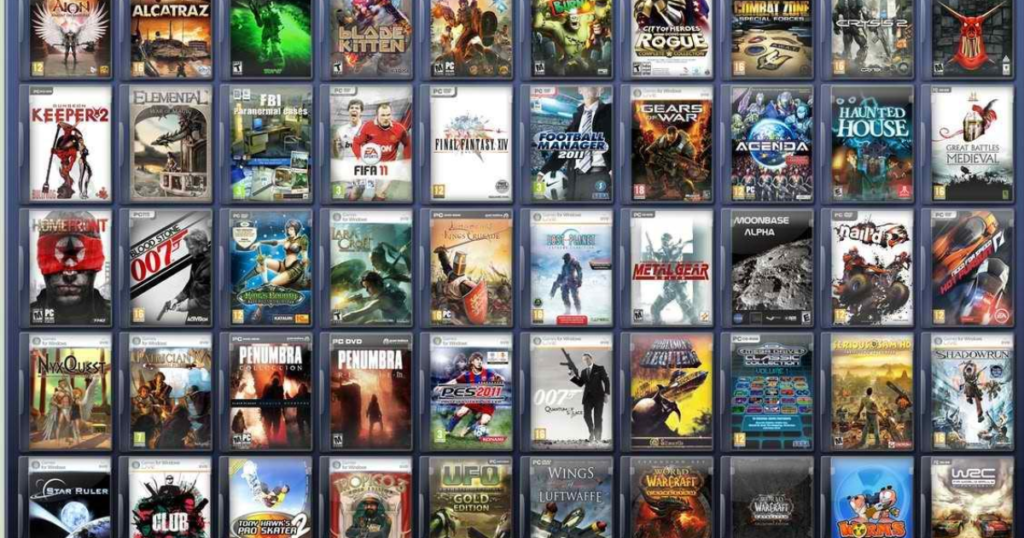Computer gaming is a dynamic and immersive form of entertainment that transports players into virtual worlds, offering a unique blend of excitement and challenge. Whether navigating epic quests, solving puzzles, or engaging in intense competitions, computer gaming captivates individuals of all ages, fostering creativity, strategic thinking, and a sense of community.
The world of computer gaming continues to push boundaries, providing an ever-expanding canvas for players to explore and enjoy. Is there anything irresistible about computer gaming? The immersive worlds, challenging quests, and social connections in computer gaming create an irresistible allure. The blend of technology and storytelling captivates players, making it a compelling escape into digital realms.
Computer games, also known as video games, are electronic games played on personal computers or dedicated gaming consoles. They encompass a wide variety of genres, including action, adventure, role-playing, simulation, strategy, and more. These games often involve players interacting with a visual interface and responding to challenges presented by the game’s software, providing entertainment, social interaction, and even educational experiences.
Computer Games in Education

The integration of computer games into education has become a transformative approach, leveraging the engaging nature of gaming to enhance learning experiences. Educational games are designed with specific learning objectives, enabling students to acquire and reinforce various skills in a dynamic and interactive environment. These games often cover a range of subjects, from mathematics and science to language arts and history, making the learning process more enjoyable and effective. computer games in education promote critical thinking, problem-solving, and collaboration, fostering a student-centered approach that adapts to individual learning styles.
The gamification of educational content has the potential to increase student motivation and engagement. By incorporating elements such as rewards, competition, and progression, educational games create a more dynamic and immersive learning environment. This approach not only captures the attention of students but also encourages them to actively participate in their own learning journey. As technology continues to advance, the use of computer games in education is poised to play a pivotal role in shaping innovative and effective teaching methodologies for the 21st century.
Top 10 Computer Games

- The Final Cut: A unique role-playing game with an innovative skill system, unforgettable characters, and a deep, branching narrative. It’s widely praised for its writing, world-building, and humor.
- Half-Life: Alyx: The best VR game to date, and a worthy successor to the legendary Half-Life 2. It offers a gripping story, immersive world, and innovative gameplay mechanics that take full advantage of VR technology.
- The Witcher 3: Wild Hunt: An open-world RPG with a vast, beautiful world to explore, a compelling story, and memorable characters. It’s praised for its visuals, storytelling, and side quests.
- Red Dead Redemption 2: An open-world action-adventure game set in the Wild West. It features a detailed and immersive world, a captivating story, and engaging gameplay mechanics.
- Elden Ring: An open-world action RPG developed by From Software, known for its challenging gameplay and intricate world design. It has been praised for its atmosphere, exploration, and boss battles.
- Fortnite: A free-to-play battle royale game that remains one of the most popular games in the world, especially among younger audiences. It offers regular updates, new content, and various game modes.
- Minecraft: A sandbox game that allows players to build anything they can imagine. It’s enjoyed by players of all ages and offers endless creativity and exploration.
- Call of Duty: The latest entry in the popular Call of Duty franchise, featuring a new campaign, multiplayer modes, and the free-to-play Warzone 2.0 battle royale experience.
- The Sims 4: A life simulation game that allows players to create and control virtual people. It’s popular for its customization options, open-ended gameplay, and variety of expansion packs.
- Grand Theft Auto V: An open-world action-adventure game set in Los Angeles. It’s known for its freedom, humor, and over-the-top action.
Top Artificial computer games

Artificial computer games refer to video games that use artificial intelligence technology. AI in these games enhances non-player character behaviors, adapts gameplay, and automates content generation, creating more realistic and engaging virtual worlds.
There are many Artificial computer games such as
- Single-player games: Single-player games are video games designed for solo play, typically featuring a solitary player navigating and experiencing the game world without direct interaction from other human players. In these games the player progresses through the story or objectives independently, without the need for multiplayer collaboration or competition.
- The Last of Us: The young companion you protect throughout the game, exhibits remarkable self-preservation instincts and emotional responses, making her feel like a real person.
- Red Dead Redemption 2: The open world is teeming with dynamic and believable NPC characters who go about their daily lives, react to your actions, and create a truly immersive atmosphere.
- Half Life 2: The Combine soldiers are relentless and adaptive enemies, employing tactics and teamwork that challenge the player strategically.
- Metal Gear Solid 2: The boss battle against Revolver Ocelot is a unique and memorable experience, as Ocelot adapts his fighting style based on your previous actions.
- Alien Isolation: The AI of the Alien is truly terrifying, as it stalks you relentlessly and unpredictably, creating a constant sense of dread.
- XCOM 2: The enemy AI in XCOM 2 is known for its ruthlessness and cunning, making each battle a tense and challenging affair.
- StarCraft II: The real-time strategy genre is known for its demanding AI, and StarCraft II offers some of the most challenging and rewarding AI opponents in the genre.
- Portal 2: The cooperative puzzles in Portal 2 require players to communicate and coordinate effectively, and the AI director dynamically adjusts the difficulty to keep things challenging.
- Chess.com: While not a traditional video game, online chess platforms like Chess.com offer highly-skilled AI opponents that can challenge even the most experienced players.
- Minecraft: The procedural generation of the world and the behavior of mobs in Minecraft are driven by AI, creating endless possibilities for exploration and discovery.
- No Man’s Sky: The vast and procedurally generated universe of No Man’s Sky is filled with unique alien lifeforms, planets, and environments, all created by AI algorithms.
- Spore: This classic game allows players to design and evolve their own creatures, and the AI simulates their behavior and interactions within a simulated ecosystem.
These are just a few examples, and there are many other games that push the boundaries of AI in innovative ways.
Frequently Answer Question
Can we create own computer game?
Yes, we can Use game development platforms like Unity or Unreal Engine, learn programming, and follow online tutorials to create your own computer game.
Is we play computer games without internet?
Yes, many computer games can be played without internet. These are often referred to as offline games, allowing gaming even when not connected.
Can we play computer games on any computer?
Yes, computer games can be played on most computers, but performance may vary based on hardware specifications and game requirements.
How do updates and patches affect computer games?
We Updates and patches improve computer games by fixing bugs, adding new features, and enhancing performance. They keep the game fresh and enjoyable for players.
Are computer games a waste of time?
NO, Computer game is not waste time its change our thinking power. Mostly games improve our mentally health.
Conclusion
In conclusion, computer games have evolved far beyond their humble beginnings as pixelated distractions. Today, they offer a diverse and sophisticated landscape, catering to a wide range of interests and preferences. From intricate narratives that tug at your emotions to challenging puzzles that demand strategic thinking, games can provide experiences that rival other forms of entertainment. But like any powerful tool, they require responsible use. Moderation and awareness of potential pitfalls are crucial to ensuring a healthy and enriching gaming experience. By finding the right balance and appreciating the creativity and innovation poured into their development, computer games can continue to be a source of enjoyment, connection, and even personal growth for players of all ages.
Games are not just about pixels and controllers, but about the experiences they create and the connections they foster. So, choose your games wisely, engage with them thoughtfully, and enjoy the unique potential they hold to transport you to new worlds and challenge your perspectives.
Meta description
Dive into a world of excitement! Explore, strategize, and have fun with computer games. Unleash your imagination and skills in immersive digital adventures.
